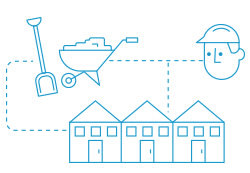Most business owners understand the main types of entities that can be set up to operate a business, such as: sole trader, company, trust and partnership.
 Each of these entities has very different qualities, with unique benefits and risks depending on the nature of the business you’re planning to run.
Each of these entities has very different qualities, with unique benefits and risks depending on the nature of the business you’re planning to run.
When it comes to setting up an entity for property development, the entities you choose (and the way they are structured) can significantly impact the outcome and profitability of your project.
If we think of entities as tools, you essentially need to choose the right tools for the job. If you want to dig a hole you use a shovel. If you want to hit a nail, you use a hammer. And the same applies to structuring your property development business.
Each entity type – and combination of entities – needs to be considered in terms of asset protection, risk mitigation, tax efficiency, flexibility, and simplicity.
There is no such thing as a “best structure”; only the right structure to support you in realising your specific goals.
With this in mind, let’s take a look at 4 typical intentions for property development and how you might structure your business to achieve them…
For a free initial consultation, simply contact our property and construction team.
